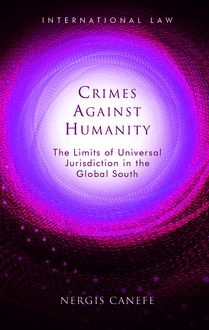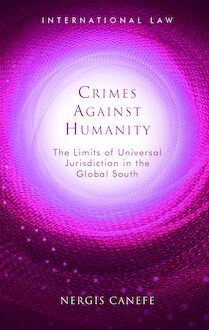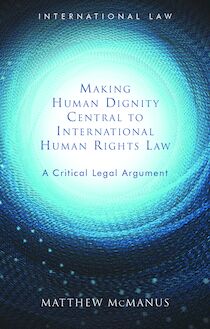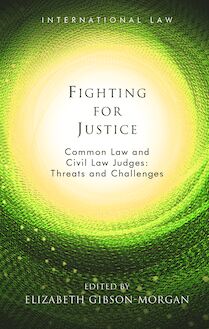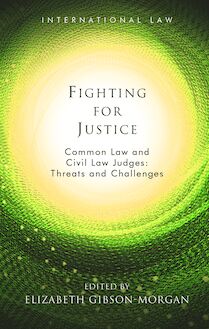-
 Univers
Univers
-
 Ebooks
Ebooks
-
 Livres audio
Livres audio
-
 Presse
Presse
-
 Podcasts
Podcasts
-
 BD
BD
-
 Documents
Documents
-
- Cours
- Révisions
- Ressources pédagogiques
- Sciences de l’éducation
- Manuels scolaires
- Langues
- Travaux de classe
- Annales de BEP
- Etudes supérieures
- Maternelle et primaire
- Fiches de lecture
- Orientation scolaire
- Méthodologie
- Corrigés de devoir
- Annales d’examens et concours
- Annales du bac
- Annales du brevet
- Rapports de stage
La lecture à portée de main
Vous pourrez modifier la taille du texte de cet ouvrage
Découvre YouScribe en t'inscrivant gratuitement
Je m'inscrisDécouvre YouScribe en t'inscrivant gratuitement
Je m'inscrisEn savoir plus
Vous pourrez modifier la taille du texte de cet ouvrage
En savoir plus

Description
This volume considers how, based on the examination of cases pertaining to transitional justice settings that resort to local interpretations of crimes against humanity jurisprudence, fragmentation of international law and circumscribed applications of universal jurisdiction are necessary aspects of the grand enterprise to overcome the impasse of the tainted legacy of international criminal law in the Global South. If we are to proceed with adjudication of the most egregious and heinous crimes involving state criminality without facing the charge of neo-colonialist plotting, then we must reckon with localised and domesticated interpretations of international criminal law, rather than pursuing strict forms of legislative dictation of international criminal law.
Frontispiece: Tree of Life, by the author
Introduction
Chapter I. Topographies of Universal Jurisdiction in International Law, Legal Pluralism and the Curious Case of the International Criminal Court
Chapter II: Universal Jurisdiction and Genealogies of International Criminal Law
Chapter III. Crimes Against Humanity Jurisprudence in International Law and The Conundrum of Jurisdictional Certainty
Chapter IV. Mea culpa, Sua culpa, Tua Maxima Culpa: Collective Responsibility, Societal WrongDoing and Legal Judgment
Chapter V. Through the Looking Glass: Hybrid Courts and International Criminal Law in the Global Sout
In Lieu of Conclusion: Deliverance of Justice in International Criminal Law and the Role of Political Judgment as Purposive Action
Sujets
Informations
| Publié par | University of Wales Press |
| Date de parution | 15 avril 2021 |
| Nombre de lectures | 3 |
| EAN13 | 9781786837042 |
| Langue | English |
Informations légales : prix de location à la page 0,3450€. Cette information est donnée uniquement à titre indicatif conformément à la législation en vigueur.
Extrait
I N T E R N A T I O N A L L A W
C RIMES A GAINST H UMANITY
Series Editors
Diane Marie Amann
University of Georgia
Yvonne McDermott
Swansea University
Editorial Board
Simon Chesterman
National University of Singapore
Fiona de Londras
University of Birmingham
Fionnuala Ní Aoláin
Queens University, Belfast and University of Minnesota
Ryszard Piotrowicz
Aberystwyth University
Volker Roeben
University of Dundee
Carsten Stahn
Leiden University
I N T E R N A T I O N A L L A W
C RIMES A GAINST H UMANITY
The Limits of Universal Jurisdiction in the Global South
N ERGIS C ANEFE
© Nergis Canefe, 2021
All rights reserved. No part of this book may be reproduced in any material form (including photocopying or storing it in any medium by electronic means and whether or not transiently or incidentally to some other use of this publication) without the written permission of the copyright owner except in accordance with the provisions of the Copyright, Designs and Patents Act 1988. Applications for the copyright owner’s written permission to reproduce any part of this publication should be addressed to the University of Wales Press, University Registry, King Edward VII Avenue, Cardiff CF10 3NS.
www.uwp.co.uk
British Library CIP Data
A catalogue record for this book is available from the British Library.
ISBN: 978-1-78683-702-8
eISBN: 978-1-78683-704-2
The right of Nergis Canefe to be identified as author of this work has been asserted in accordance with sections 77 and 79 of the Copyright, Designs and Patents Act 1988.
The publisher has no responsibility for the persistence or accuracy of URLs for any external or third-party internet websites referred to in this book, and does not guarantee that any content on such websites is, or will remain, accurate or appropriate.
Cover image © Freepik
This work is dedicated to Howard Adelman, an untiring mind with valour and a conscience with patience and wisdom – a mentor, friend, guide and pathfinder: ‘hic manebimus optime!’
Tree of Life , by Nergis Canefe
Series Preface
The International Law series aims to give a platform to dynamic and cutting-edge research in international law, with a strong focus on legal theory in international law.
Nergis Canefe’s Crimes Against Humanity is an ambitious scholarly project, which builds on an impressively broad range of scholarship to propose a fundamental rethinking of the role of universal jurisdiction in securing justice and accountability for the victims of egregious and systematic mass human rights violations. Firmly situated in the rich tradition of critical legal scholarship, Canefe’s work is notable for its seamless fusion of theoretical and practical considerations.
This outstanding book is a very welcome addition to the International Law series. We continue to welcome proposals for books that bring new and exciting perspectives on diverse areas of international law.
Professor Diane Marie Amann
University of Georgia
Professor Yvonne McDermott
Swansea University
Contents
Acknowledgements
List of Acronyms
Introduction
1 Topographies of Universal Jurisdiction in International Law, Legal Pluralism and the Curious Case of the International Criminal Court
Introduction
I. Applications of Legal Pluralism in International Law
A. The Legacy of the New Haven School
B. TWAIL Scholarship and the Radical Pluralism Debate
C. Radical Pluralism and Beyond
II. Transnational Character of Accountability Regimes in International Law and Multicentricity of Legal Practices
A. Fragmentation in International Law and the Fragile Balance of Primary and Secondary Rules in Accountability Regimes
B. The Project of International Law and the Jurisprudential Promise of the ICC: Disciplining the Domestic Realm through International Criminal Law?
C. International Criminal Court and the Ideal of Complementarity in International Law
D. Mandate of the International Criminal Court: Jurisprudential versus Political Realities
Conclusion
2 Universal Jurisdiction and Genealogies of International Criminal Law
Introduction
I. Nemo Me Impuna Lacessit? The Ethos of Universal Jurisdiction
II. Divided We Unite? Fragmentation and Legitimacy in International Law
III. Legitimacy of International Law: Lingering Questions
IV. The Question of the State in International Law as Seen from the Global South: A Chance to Start Anew?
V. Jus Gentium and the Outer Limits of International Law
VI. Jus Cogens or Not – Dilemmas?
Conclusion
3 Crimes Against Humanity Jurisprudence in International Law and the Conundrum of Jurisdictional Certainty
Introduction
I. The Normative Architecture of Crimes Against Humanity Jurisprudence
II. Competing Politico-Normative Visions
III. Adjudication, Responsibility and the Law: Limits of Universal Jurisdiction
Conclusion
4 Mea Culpa, Sua Culpa, Tua Maxima Culpa: Collective Responsibility, Societal Wrongdoing and Legal Judgment
Introduction
I. Beyond Eichmann: On the Necessity of Judgment
II. Towards an Engaged Theory of Judgment and Collective Responsibility
A. The Threshold Question
B. The Outcomes Perspective
III. Collective Responsibility and Legal Judgment in International Law: The Jaspers Alternative?
IV. Moral Responsibility as an Epicurian Cure for the Conundrums of International Criminal Law?
V. Collective Responsibility and the Distribution of Blameworthiness
Conclusion: The Dilemma of the Sum Total versus Its Constitutive Parts
5 Through the Looking Glass: Hybrid Courts and International Criminal Law in the Global South
Introduction
I. Mapping Out Responsibility for Mass Atrocities
A. More Than Each unto His Own – Hybrid Courts in the Global South
II. The Clarion Call of Universal Jurisdiction in the Global South
A. The ICC and Domestic Applications of the Rome Statute
B. The ICC and the Importance of the Complementarity Principle for the International Legal Accountability
III. Hybrid Courts: Fractured or Overlapping Legal Regimes of Accountability?
Conclusion: Hybrid Courts as New Actors of International Criminal Law in the Global South?
In Lieu of Conclusion: Deliverance of Justice in International Criminal Law and the Role of Political Judgment as Purposive Action
Notes
Bibliography
Acknowledgements
This work’s completion spanned over a decade. At Osgoode Hall Law School, Toronto, Canada, I am truly indebted to Craig Scott, Leora Salter, Ruth Buchanan, the late Michael Mandel, Les Jacobs, Allan Hutchinson, Leslie Green, Sharry Aiken, Harry Arthurs, Amar Bhathia, Peer Zumbansen and Sonia Lawrence for their critical stance, superb guidance and scholarly advice.
At the non-Osgoode part of York University, I owe special thanks to colleagues and friends who encouraged me not to give up the ‘project’ despite illnesses and deaths in the family and my own trials and tribulations with cancer and all that comes with it. I am especially marked by the gentle and yet assuring hand of Brenda Spotton, Lorne Foster, Soren Frederiksen, David Mutimer, Elizabeth Dauphinee, Anna Agathangelou, Margo Baretto and Carolyn Cross. They became the pillars of strength and calm in an ever-changing tide of life circumstances, steadying my racing mind and bringing back focus and concentration whence memory and sense left me adrift.
I also benefited immensely from the scholarship and friendship of Ranabir Samaddar, Paula Banerjee and Nasreen Chowdhory in Calcutta, India; Galya Ben-Arieh in Evanston, USA; Roberto Lopez and Beatriz Sanchaz Mojica in Bogotà, Colombia; Loren Landau in South Africa; Chris Dolan in Kampala, Uganda; and Susan McGrath, Jennifer Hyndman and Michele Millard in Toronto, Canada, all of whom shared their wisdom and insights with me on state criminality and dimensions of human suffering gone unacknowledged. We worked together on various projects pertaining to ethical, socio-political and legal dimensions of transitional justice in the Global South throughout the past decade.
In Istanbul, Turkey, I would like to thank Galma Akdeniz, Seda Kalem, Seda Peker, Gökçe Çataloluk and Bilgi University Law School faculty and students at large for being a most welcoming and yet engagingly critical audience for many of my ideas at their reception. In particular, Turgut Tarhanlı has been both an inspiration and a true beacon of light despite many an unforgivable and unforgettable development in the region. As the long-standing Dean of Bilgi University Law School, he encouraged and actively supported me to mount my own courses on international criminal law, transitional justice, state criminality and comparative administrative law in Turkey. During my several short stays in Istanbul, teaching international law, I had a chance to share some of my findings with extremely courageous and well-read human rights lawyers who were doing their graduate degrees and I also owe them all such gratitude for thinking together, identifying key problem areas concerning the applications of international criminal law in the Global South, and on the rare occasion solving very difficult legal puzzles, at least for future purposes when they will be able to openly engage with these issues despite a genuine threat of incarceration. In particular, I would like to thank Zülfiye Yılmaz, Can Turgut, Özge Demir and Ezgi Çetiner.
As a special note in closing, I owe so much more than thanks to one particular person. I do not know where this work would have been today without the stern but always thoughtful and thorough interventions and, ultimately, guidance of Obiora Okafor. I could only hope that I succeeded in developing a deeper understanding of his commitment to TWAIL scholarship under his tutelage. I am ever so grateful that he took this mammoth project in his able hands and pushed it in the direction of taking the shape of a finite manuscript with inner coherence and contemporary applicability. All the failings and shortcomings of this work are no
-
 Univers
Univers
-
 Ebooks
Ebooks
-
 Livres audio
Livres audio
-
 Presse
Presse
-
 Podcasts
Podcasts
-
 BD
BD
-
 Documents
Documents
-
Jeunesse
-
Littérature
-
Ressources professionnelles
-
Santé et bien-être
-
Savoirs
-
Education
-
Loisirs et hobbies
-
Art, musique et cinéma
-
Actualité et débat de société
-
Jeunesse
-
Littérature
-
Ressources professionnelles
-
Santé et bien-être
-
Savoirs
-
Education
-
Loisirs et hobbies
-
Art, musique et cinéma
-
Actualité et débat de société
-
Actualités
-
Lifestyle
-
Presse jeunesse
-
Presse professionnelle
-
Pratique
-
Presse sportive
-
Presse internationale
-
Culture & Médias
-
Action et Aventures
-
Science-fiction et Fantasy
-
Société
-
Jeunesse
-
Littérature
-
Ressources professionnelles
-
Santé et bien-être
-
Savoirs
-
Education
-
Loisirs et hobbies
-
Art, musique et cinéma
-
Actualité et débat de société
- Cours
- Révisions
- Ressources pédagogiques
- Sciences de l’éducation
- Manuels scolaires
- Langues
- Travaux de classe
- Annales de BEP
- Etudes supérieures
- Maternelle et primaire
- Fiches de lecture
- Orientation scolaire
- Méthodologie
- Corrigés de devoir
- Annales d’examens et concours
- Annales du bac
- Annales du brevet
- Rapports de stage
